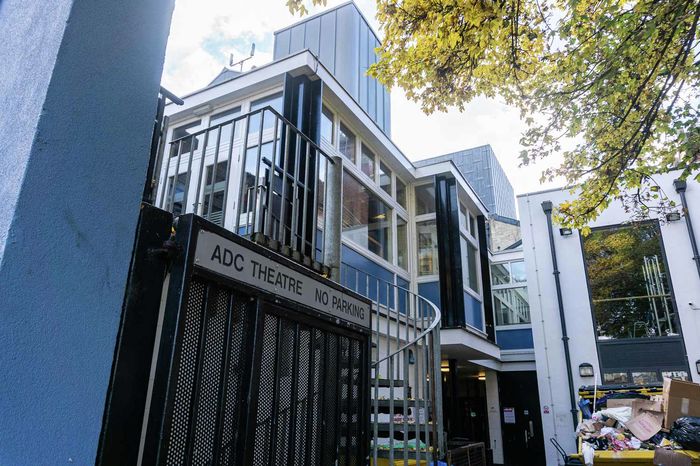CAST’s Julius Caesar must be seen by friends, Romans and countrymen alike
This year’s CAST play speaks, strikes, and redresses our hiatus from Cambridge theatre

Fresh off the plane from America’s East Coast, the Cambridge American Stage Tour (CAST) ends their epic tour in our very own ADC. Julius Caesar was the choice for the annual Shakespeare play; it tells of the conspiracy to overthrow Caesar, his murder on the infamous Ides of March and the rival factions that splinter after his death, headed by Brutus and Mark Antony into bloody warfare.
It is always a joy to see student theatre after an extended run. The fact that this production has been in the works since February, means that the cast were able to really relax into this play with the tricky language being handled confidently and professionally. As an Engling, it was wonderful to see it exemplified that when Shakespeare is done well, the audience is welcomed into, not scared away from the language. It is clear that it is the impressive talent of the cast which makes this Shakespeare production internationally accessible.
“It is clear that the impressive talent of the cast makes this Shakespeare production internationally accessible”
Isaac Jackson gives an impressive performance as Brutus. Though initially unassuming, his (admittedly sudden) change of heart thanks to the calculated Cassius (Eanna Ferguson) feeds an ambition in him, soon placing him at the centre of the rebellion. But it was Eyoel Abebaw-Mesfin who stole the show as the grounded and determined Mark Antony, mourning Caesar and swearing to avenge his death. He brought the perfect amount of intensity at just the right moment to destabilise the momentum of Brutus’ rebels. Eddie Adams also excels in the role of Caesar; his interpretation of the character is almost Eton-esque, with the ruler happy to have his ego inflated. It was for this reason that he felt out of touch and unfit to rule, as opposed to him being elderly, a refreshing interpretation. Gwynneth Horbury also deserves a mention for her fleeting performance as the distraught and distressed Portia, wife of Brutus.
Imogen Gray’s direction is particularly strong in the ‘Friends, Romans, Countrymen’ portion of the play. Brutus and Antony each take their turn to persuade the crowd of who they believe to be in the wrong following Caesar’s death, with the crowd being swayed in all directions. Gray plants the cast amongst the audience, cheering and jeering as Brutus and Antony address us directly. This was an inspired choice, which was very successful in subjecting us to the persuasive orations of the rival leaders that left the crowd of ‘plebeians’ swayed ultimately by whoever spoke last.
“An unsettling reminder of the worrying capacity of control that leaders have over a nation’s perspective”
Different posters flew in after each speech, replacing the face of Caesar with a muddle of Brutus and Antony that added to the noisy uncertainty — an unsettling reminder of the worrying capacity of control that leaders have over a nation’s perspective and thought. One can only imagine the increased significance of this choice in America, currently deep in the presidential race.
I feel that the production was unfortunately let down somewhat by its costumes; the shirts and blazers brought us vaguely to modern day, though the outfits of Caesar and Antony were not quite familiar enough to seem real. The ‘plebeians’ wore a uniform of knitted American varsity cardigans for a reason which remains unknown, the women were inexplicably barefoot, with Calphurnia (wife of Caesar) in a snakeskin print dress, and Brutus’ rebels spent the second half almost comically dressed in matching black pleather shirts. The costumes did not commit to being either dystopian or modern, and left the look of the play feeling incohesive.
That said, what the play lacked in costume it made up for in the clever use of a gauze as Charley Ipsen’s set design married with Edward Lancaster and Peter Baker’s lighting complimented the brooding drama of the play. The gauze created distance, and an air of superiority for whoever was in charge. Physically creating a divide between the public and the powerful meant we saw the leaders watching over the chaos of Rome — and the people who give them power — without needing to get their hands dirty.
Overall, CAST’s production of Julius Caesar demonstrates the enduring power of Shakespeare’s work in what felt like a particularly relevant choice of play. I applaud the cast and crew on a fresh and striking rendition and thank them for setting a very high bar to kick off another year of Cambridge theatre.
 News / Clare Hall spent over £500k opposing busway 24 December 2025
News / Clare Hall spent over £500k opposing busway 24 December 2025 News / Caius mourns its tree-mendous loss23 December 2025
News / Caius mourns its tree-mendous loss23 December 2025 Comment / The ‘class’ of Cambridge24 December 2025
Comment / The ‘class’ of Cambridge24 December 2025 Comment / Yes, I’m brown – but I have more important things to say22 December 2025
Comment / Yes, I’m brown – but I have more important things to say22 December 2025 Interviews / Politics, your own way: Tilly Middlehurst on speaking out21 December 2025
Interviews / Politics, your own way: Tilly Middlehurst on speaking out21 December 2025










